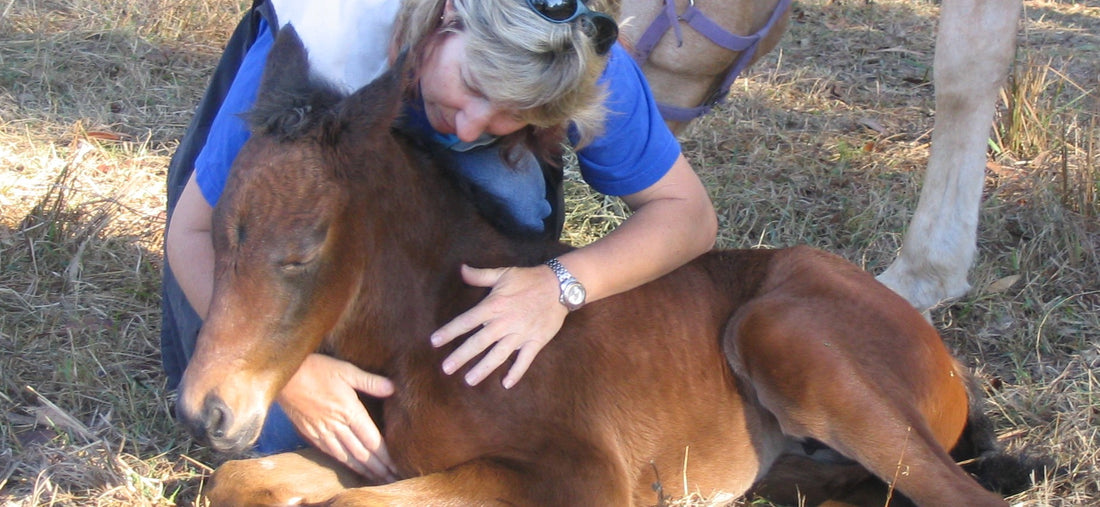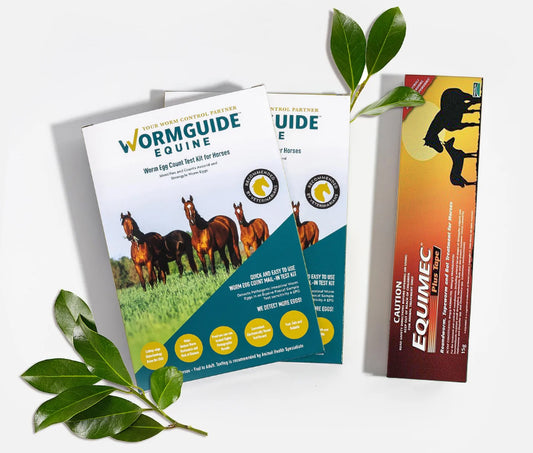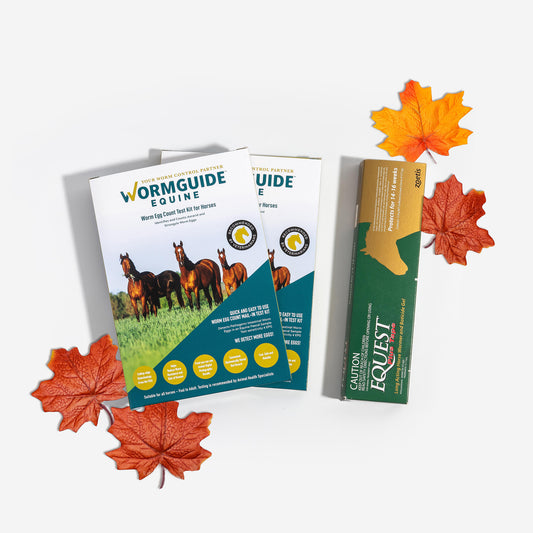The biggest pleasure we get at WormGuide is when our clients are informed, empowered and connected when it comes to their horses` worm control. In fact, nothing makes us happier than seeing the strong partnerships we develop with all our clients by providing reliable and precise faecal egg count (FEC) evidence to treat their horses right.
Great things happen when we work together!
WormGuide stories are proof of these collaborations – and the partnerships we form with all our clients.
Key Takeaway
During the past 2 years with WormGuide Jenny has reduced worming treatments by 73% to slow the development rate of harmful wormer resistance.
And… nothing bad happened!
All horses are happy and healthy living their best life.
Jenny`s Outcome Checklist

- Applied best practice to protect her horses
- Developed a meaningful and sustainable worm control program
- Reduced worming treatments by 73%
- Eliminated guesswork, forever
- Stopped overusing chemical treatments
- Stopped wasting money on wormers that don`t work
- Stopped wormer rotation – it doesn’t prevent resistance
- Constructed a worm control program that works
- Applies basic foundation deworming for all horses – every 6 months
- Tests for worm egg type in foals and yearlings to facilitate choice of wormer
- Targets adult horses that have high egg shedding levels (high egg counts)
- Tests for wormer resistance once a year
- Monitors egg shedding levels twice a year
- Tests new arrival horses to avoid introducing resistant worms to the property
A horse lover, Jenny has experience in the racing industry, breeding, reining with her quarter horses, and enjoys a day out at the beach with her horses.

Jenny is also very informed about worm control and takes pride in keeping abreast of the latest scientific thinking on deworming.
New scientific information and knowledge have been generated and better faecal egg count (FEC) technology has emerged that can help manage the way around the devastating situation of wormer resistance that`s challenging the equine industry.
Like many other responsible and proactive horse owners who want to treat their horses right, Jenny is responding to the up-to-date official set of recommendations (based on the best possible scientific evidence available) to help horse owners, managers and veterinarians develop improved strategies and programs to combat drug resistance.

Two of Jenny`s beautiful quarter horses – Cheeky and Knight. Which one is Cheeky?
The Problem
Jenny came to WormGuide thinking she must make positive changes to her worm control approach. What she came to realise is that her entire strategy needed to change to the current best practice recommendations to protect her horses.
Jenny wanted to delay the consequences of devastating wormer resistance that is challenging veterinarians, horse owners and managers everywhere.
Jenny elaborated, “I don`t know what I will do when all the wormers stop working.”
WormGuide conservatively calculated that Jenny was medicating her horses too much – not only wasting money, time, effort, and de-worming medicine but asking for drug resistance, probably multi-drug resistant worms.
Jenny wanted to find out if the chosen wormers she uses still work.
Jenny also wanted to construct an individual worming program for each mature horse based on FECs to find out if any of her horses are high egg shedders– which she had never done before.

The Solution
After getting to know Jenny, her worming schedule, and her smart vision to change to the up-to-date scientific recommendations, WormGuide provided clarity on the official recommendations to help develop improved strategies and programs that work on her horse property.
Below is Jenny`s past traditional battleplan schedule that experts say is the major cause of resistance - treating all horses too much - four to six (or more) times a year and rotating the worming products was asking for drug resistance – probably multi-drug resistant worms.
... faithfully marked with worming dates and products used.
Maybe you can relate.
The traditional method in which all horses are treated (medicated) every 6 - 8 -12 weeks and rotating through worming products worked for a while but over time many worm species have developed or are in the process of developing resistance to dewormers due to the constant overuse of these products.
Jenny says,” It worked for years but turns out we didn`t know what we were setting ourselves up for. Wormer resistance doesn`t happen overnight, it takes years to develop and show up and it can`t be reversed. There are many reports of wormers not working anymore and that`s scary. And there won`t be a new worming drug for a very long time, if ever. I made the change because I want to protect my horses as much as possible.”
Jenny`s Up to Date Worm Control Program
Adult horses
Jenny`s horses have access to pasture year-round in a sub-tropical region - so worm control is year-round. All her horses receive a basic foundation treatment twice a year – every 6 months during spring and autumn against stages of the small strongyle worm and to control the less desirable tapeworm and prevent the large strongyle (bloodworm) that are more capable of causing disease.
A horse that always has a high strongyle egg count (high egg shedder) is selected for additional treatment to lower the infection pressure (number of eggs) on pasture.
1. Check chosen wormer works once a year
Test Treat Check
2. Monitor egg shedding levels twice a year
Good parasite control starts and ends with testing the wormers being used and this must be done every year. Horse scientists and parasitologists strongly suggest this is now the most important step to take.
It is considered best practice to use the products that are effective against the parasites present on your horse property.
Test Treat Check
Test with Super Surveillance egg count, treat with worming treatment, compare result with the Truth Teller egg count by checking 10 – 14 days later for a reduction in the number of eggs - there should be no eggs! The testing will also monitor egg shedding level.
OR
Use the convenient Spring or Autumn Advantage Set. This set includes test with the Super Surveillance egg count, treat with recommended basic foundation treatment, and check for a reduction in the number of eggs with the Truth Teller egg count - there should be no eggs! The testing will also monitor egg shedding level.
Monitor egg shedding level
Test with the Super Surveillance egg count to monitor egg shedding levels to classify each horse as a low, moderate or high egg shedder to treat each horse as an individual. Although unlikely there is always the possibility that a low egg shedder shifts to a high egg shedder and should be selected for additional treatment.
Young Horses
- For her foals, Jenny uses the Foals First Year of Life Bundle to keep ascarids (roundworm) under control to avoid the risk of worm impaction, worm types to guide the choice of dewormer and check the wormer used works.
- To find out what to deworm with is mostly relevant for young horses under 3 years (especially foals and yearlings) because none of the worming drugs work effectively and reliably against both ascarids ( roundworm) and small strongyle worms on most horse properties. The Super Surveillance FEC tells Jenny what type of worm needs to be treated and the Truth Teller checks the efficiency of the chosen product.

Jenny says, “Weaning is such a stressful time for horse babies, so I want to make sure worm burdens don`t compound the situation.”
- Jenny also tests new arrival horses with the Super Surveillance egg count, treats with wormer she uses then checks 10-14 days later with the Truth Teller FEC to compare egg count results to ensure the treatment works before turning out to pasture with other horses. This strategy helps to avoid introducing resistant worms to her property.
Favourite Dr Martin Nielsen quotes?

Dr Martin Nielsen – leading world researcher and expert
Jenny`s faves are:
“Without faecal egg counts you don`t have a clue what you are doing.”
“If you`re not doing the post treatment egg count – you are missing the point.”
BTW that`s WormGuide`s Truth Teller FEC Test
“Even the cheapest dewormer is very expensive if you use it repeatedly and it doesn’t work.
Jenny is an informed, empowered, and connected WormGuider spreading the word about the new scientific information and knowledge that has been generated by extensive research studies about worm control, and improved precision egg counting technology that has been developed.
Together we can make a difference
Slowing resistance works best if everyone does it, so join Jenny to treat horses right and help spread the word!
Here at WormGuide we align ourselves with the latest and best scientific research available and support the use of advanced technology to provide our clients with the most precise egg counting technique available. In this era of wormer resistance, it`s the only way forward!
Now you know what’s possible, do you want to improve your worm control strategy and resistance control based on the latest comprehensive set of guidelines too? Click here to get your horse`s sample collect and send Kit for testing with the most precise high performing egg count available.
Read on for a very important message.
Here is more evidence that shows traditional frequent worming is unnecessary
This study highlighted that reducing our use of worming treatments does not create adverse health risks in adult horse health or development of young horses and is therefore something that is safe for us to do!
Important message
To help share the results of this significant study Dr Nielsen has produced two short explanatory videos to spread the word about this important message. One for vets and one for horse owners.
Click on the link below and head over to learn more about the research that supports the move away from the traditional frequent interval-dosing parasitologists now believe to be the major factor responsible for the current high levels of dewormer resistance.
Vets
Horse owners
https://www.youtube.com/watch?v=KAE5xnJuaFs
The full research paper was first published on 29 October 2020 in Equine Veterinary Journal and can be read here
To protect your horse, canter to our collections and build your horse`s customised worm control program. You will receive WormGuide`s exclusive 'What do my Results Mean? Guide' with your horse`s egg count result.
Build a worm control program that works to delay resistance today.











